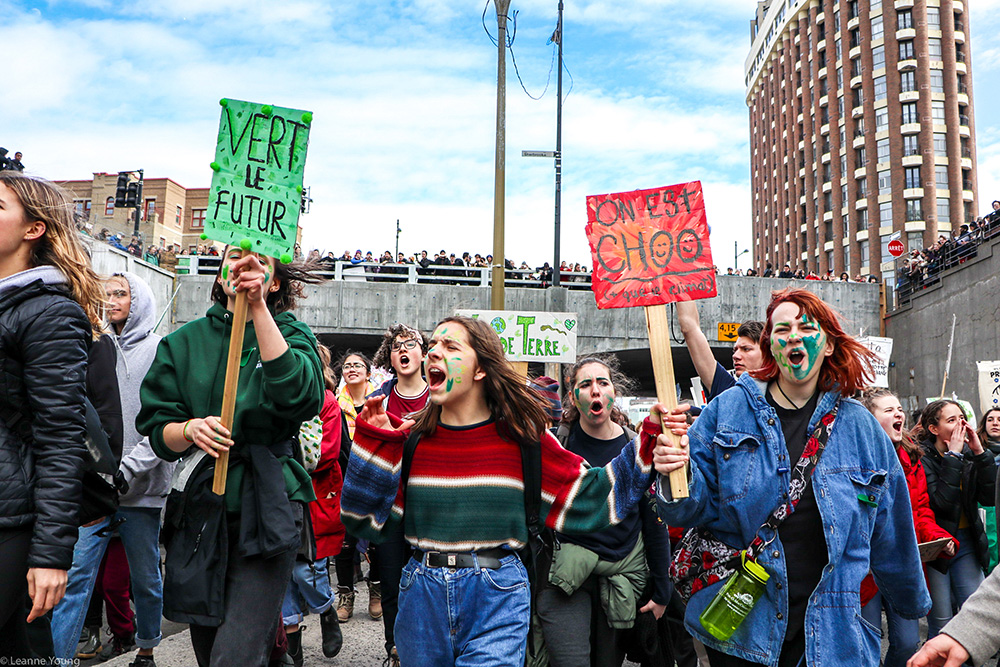Sometimes the burden of climate change feels like a futile battle. We’ll use a reusable water bottle, never touch a plastic straw, attend the climate strike, donate to fight Australia’s wildfires, and tweet #FridaysForFuture at our politicians, but still temperatures are rising, pollution is increasing, and our institutions and governments remain complicit. We can’t carry the responsibility of ending the climate crisis by individual actions when our economic and political systems are designed to exploit earth’s resources and allow the hoarding of wealth by an elite few. We need to utilize our collective strength and demand systemic change, or else our future will be annihilated. It’s time for another climate strike.
The Canadian government declared a climate emergency on June 17, but approved the Trans Mountain Pipeline extension the following day, violating the sovereignty and human rights of the Secwepemc nation and other Indigenous communities while cementing Canada’s international role as a climate criminal. The McGill administration has touted carbon reduction and sustainability on campus, but won’t divest from oil, coal, and gas or discontinue its research focused on weapons and the fossil fuel industry. To members of the McGill administration, whose wealth insulates them from the onslaught of climate change, maintaining an unsustainable and traditional social order is more important than transitioning towards a livable future. To them money is more important than our collective livelihood. To the members of C-JAM, their actions are nothing more than fraudulent greenwashing and attempt to depoliticize the climate crisis. Given the consequences, this can no longer be accepted. We need those abusing their power to feel our shared power.
The fact that some are contemplating or denying that it is time to act relies on a lot of privilege. The fatal consequences of the climate crisis are already here, seen by the recent disasters in Indonesia, Bangladesh, Puerto Rico, the Carribean and more; this will only get worse. The effects of climate change disproportionately impact systematically marginalized groups (including Indigenous, Black, poor, racialized, and Global South communities) who are least responsible for the ecological crisis, while the corporate and political elite emit the majority of carbon and abdicate any responsibility. Due to the ways that systems of oppression overlap and reinforce one another, if we are to combat racism, sexism, classism and other forms of oppression, we must turn to climate justice. For example, those that want to weaken or abolish environmental regulations are the same people who invade Indigenous lands and violently disregard sovereignty rights and Indigenous knowledge. We see this now as Coastal GasLink and the Royal Canadian Mounted Police are illegally occupying Wet’suwet’en territory, harassing, surveilling, and arresting land defenders to protect oil and the colonial state. As students with the ability to democratically strike, it is imperative that we mobilize alongside the many activists leading the movement to transform the world at a crucial moment in history. We must envision environmental prosperity in the context of social equity, because no one is free until we all are. It’s time for McGill to stop being complicit.
The protests on March 15 and Sept. 27, 2019 were historic in size, but without sustained momentum, their influence on McGill’s administration and Canada’s government leaders dwindles; their relevance, galvanism, and potential are lost. Together, across McGill’s faculties and departments, students can democratically vote for a strike that will legitimize our demands and increase public consciousness of the urgency of climate change. Our collective power, combined with that of other educational institutions, can force recognition by both McGill and the Canadian federal government. Our privilege to perform intellectual labour roles is shared with our responsibility to forge a future that’s worth earning our education for. As future workers, students provide a vital service to the economy and McGill and without our cooperation, neither will be able to function smoothly. Striking is powerful enough to force the government to listen to us rather than waiting for their insufficient responses to petitions, letters, and speeches. Nothing is as politically empowering within a democratic society than people committing non-violent direct action against institutional authority. Only with collectivized, disruptive, and prolonged action will we progress the fight against climate change.
As millions of people are rising up around the world, it is time for us to take a stand against the systems of oppression that are preventing necessary climate action. It’s with all of this in mind that we’re joining the Coalition étudiante pour un virage environnemental et social (CEVES) in their strike week. From March 30-April 3, strike with us and participate in campus protests and actions. Join environmental groups country-wide to collectively take the future into our hands.








